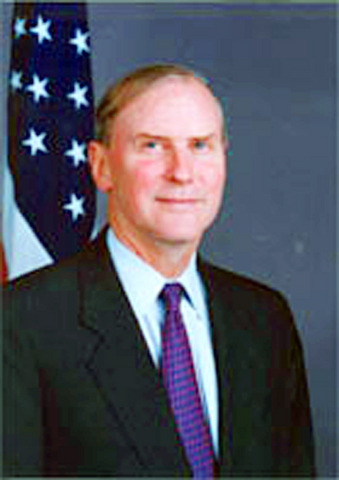American Institute in Taiwan (AIT) Director Douglas Paal is scheduled to leave his post on July 1, and his likely replacement will be veteran diplomat Stephen Young, sources in Washington and Taipei told the Taipei Times yesterday.
When asked to comment on the issue, AIT deputy spokeswoman Nadine Siak confirmed that Paal is planning to leave, but said she had no further information on the date of his departure or who his replacement would be.
A US government source, speaking on condition of anonymity, said that it was an "open secret" in Washington that Young was Paal's most likely successor.

PHOTO: US STATE DEPARTMENT
Young is currently the US ambassador to Kyrgyzstan, a post he has held since July 25, 2003. He has been in the US Department of State for 25 years, and is a former AIT deputy director as well as a former director of the State Department's Office of Chinese and Mongolian Affairs.
AIT is the de facto US embassy in Taiwan established under the US' Taiwan Relations Act, and appointments to the post of AIT director -- in effect the US ambassador to Taiwan -- do not require Senate confirmation.
The appointment of a career foreign-service officer as the head of AIT would probably be greeted with enthusiasm by State Department officials and their Taiwanese counterparts, the source said.
"With Steve [Young], you know what you are getting," a separate source in Taiwan said.
"At least he's diplomatic -- a real professional," the source said.
Many observers of Taiwan-US relations have said that the Bush and Chen administrations have had a difficult relationship in recent years, and some have specifically said that part of the problem was the personal animosity between President Chen Shui-bian (
One senior US official said that Chen and Paal "dislike each other so intensely that they hardly ever meet."
The official cited a series of missteps and miscommunications as the source of the friction, saying that "Paal had the deck stacked against him before he even came to Taiwan."
"Some Taiwanese officials were very open about their dislike of Paal before he came to Taipei," the official said.
"As a result, Paal understandably had a chip on his shoulder when he got here," the official said.
However, the US government source said this was idle rumor-mongering.
"Even if there were personal issues, Doug [Paal] and Chen are too professional to let it affect US-Taiwan relations," the US source said.
It was not immediately clear if Paal plans to continue in government service. But the US source said it was widely thought that Paal would be "promoted" within the Bush administration.

Taiwan is gearing up to celebrate the New Year at events across the country, headlined by the annual countdown and Taipei 101 fireworks display at midnight. Many of the events are to be livesteamed online. See below for lineups and links: Taipei Taipei’s New Year’s Party 2026 is to begin at 7pm and run until 1am, with the theme “Sailing to the Future.” South Korean girl group KARA is headlining the concert at Taipei City Hall Plaza, with additional performances by Amber An (安心亞), Nick Chou (周湯豪), hip-hop trio Nine One One (玖壹壹), Bii (畢書盡), girl group Genblue (幻藍小熊) and more. The festivities are to

Auckland rang in 2026 with a downtown fireworks display launched from New Zealand’s tallest structure, Sky Tower, making it the first major city to greet the new year at a celebration dampened by rain, while crowds in Taipei braved the elements to watch Taipei 101’s display. South Pacific countries are the first to bid farewell to 2025. Clocks struck midnight in Auckland, with a population of 1.7 million, 18 hours before the famous ball was to drop in New York’s Times Square. The five-minute display involved 3,500 fireworks launched from the 240m Sky Tower. Smaller community events were canceled across New Zealand’s

‘SLICING METHOD’: In the event of a blockade, the China Coast Guard would intercept Taiwanese ships while its navy would seek to deter foreign intervention China’s military drills around Taiwan this week signaled potential strategies to cut the nation off from energy supplies and foreign military assistance, a US think tank report said. The Chinese People’s Liberation Army (PLA) conducted what it called “Justice Mission 2025” exercises from Monday to Tuesday in five maritime zones and airspace around Taiwan, calling them a warning to “Taiwanese independence” forces. In a report released on Wednesday, the Institute for the Study of War said the exercises effectively simulated blocking shipping routes to major port cities, including Kaohsiung, Keelung and Hualien. Taiwan would be highly vulnerable under such a blockade, because it

UNDER WAY: The contract for advanced sensor systems would be fulfilled in Florida, and is expected to be completed by June 2031, the Pentagon said Lockheed Martin has been given a contract involving foreign military sales to Taiwan to meet what Washington calls “an urgent operational need” of Taiwan’s air force, the Pentagon said on Wednesday. The contract has a ceiling value of US$328.5 million, with US$157.3 million in foreign military sales funds obligated at the time of award, the Pentagon said in a statement. “This contract provides for the procurement and delivery of 55 Infrared Search and Track Legion Enhanced Sensor Pods, processors, pod containers and processor containers required to meet the urgent operational need of the Taiwan air force,” it said. The contract’s work would be